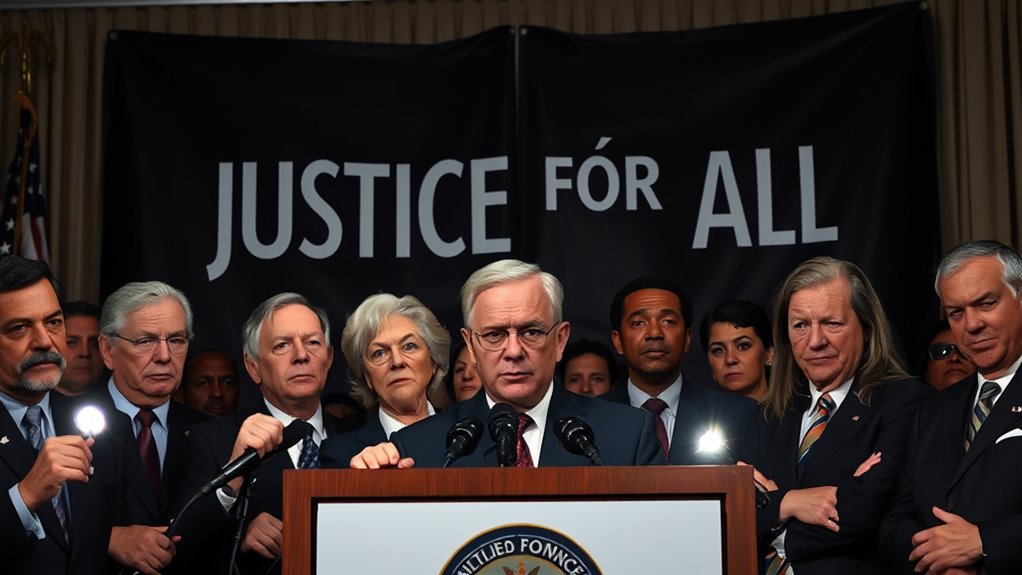The controversy over Mayor Eric Adams' indictment raises serious questions about the Trump administration's alleged weaponization of justice. Many see the dismissal of charges as a sign of political influence undermining the DOJ's integrity. Resignations from senior prosecutors highlight concerns about prosecutorial bias. Public trust is eroding as accusations of quid pro quo emerge, complicating Adams' position. You'll want to explore what this means for the legal system and the implications for democracy in the broader context.
Key Takeaways
- Allegations of quid pro quo between Mayor Adams and the Trump administration raise serious concerns about political influence in legal decisions.
- The dismissal of charges against Adams has led to resignations of senior DOJ officials, signaling internal conflict over political pressures.
- Critics argue that the dismissal exemplifies the weaponization of justice for political gain, undermining public trust in the legal system.
- Legal experts express ethical concerns regarding the implications of political motivations on prosecutorial discretion and justice integrity.
- The controversy surrounding the Adams case reflects broader issues of corruption and political bias within the DOJ, eroding public confidence in accountability.
Background on the Adams Case and Legal Challenges

As allegations of corruption surfaced, New York City Mayor Eric Adams found himself embroiled in a legal battle that raised significant concerns about the integrity of the judicial system.
Adams faced an indictment on five counts for violating federal anti-corruption laws, including accepting over $100,000 in gifts from Turkish nationals in exchange for favors.
However, the U.S. Justice Department's unexpected move to seek dismissal of these charges ignited fears of political motivations, particularly given the ties to the Trump administration. The situation underscores the importance of advance directives to ensure that legal and ethical standards are upheld even when individuals are unable to communicate their wishes.
The Justice Department's push to dismiss charges raised suspicions of political interference linked to the Trump administration.
Allegations of a quid pro quo arrangement regarding immigration policy further complicated the situation.
The dismissal led to resignations among federal prosecutors, including Manhattan's top prosecutor, amplifying concerns about the politicization of the DOJ and the integrity of the legal process. Additionally, the case has drawn attention to the importance of clear communication in legal proceedings, as misunderstandings can exacerbate tensions and lead to further disputes.
Resignations Within the DOJ: A Sign of Internal Conflict

The fallout from the DOJ's decision to dismiss the charges against Mayor Eric Adams has sparked a wave of resignations that highlight deep-seated conflicts within the department.
Six senior officials, including top prosecutor Danielle Sassoon, stepped down, citing ethical concerns over political influence undermining the DOJ's integrity. Open communication about the implications of such decisions is crucial for restoring trust within the department.
Sassoon publicly opposed the dismissal, reaffirming her prosecutorial duty to handle federal crimes impartially.
This mass resignation echoes the Saturday Night Massacre, revealing troubling tensions regarding the politicization of justice.
- Resignations signal deep internal conflict within the DOJ
- Sassoon's departure underscores ethical concerns
- Dismissal seen as a capitulation to political influence
- Corruption charges against Adams remain controversial
- Emotional healing is often necessary for those affected by these tumultuous events.
Allegations of Quid Pro Quo and Political Motivations

You might find it troubling that allegations of quid pro quo have surfaced in the Adams case, suggesting political influence in prosecutorial decisions.
The resignation of senior DOJ prosecutors highlights the deep concerns over the integrity of justice when politics enter the equation. This situation mirrors the emotional impacts that often arise when trust in systems is compromised.
As you consider this, think about how these events could affect public trust in the legal system. Furthermore, the situation raises questions about the potential impact on retirement savings plans for public servants who may feel pressured to navigate political landscapes rather than uphold justice.
Political Influence on Prosecution
Amidst the swirling allegations of a quid pro quo between Mayor Eric Adams and the Trump administration, concerns about political influence on prosecution have taken center stage.
Critics argue that the Justice Department's decision to dismiss charges against Adams reflects deeper issues of corruption and undermines the integrity of the legal system. Additionally, the average duration of divorce proceedings in states like Georgia can span 6 to 12 months, indicating lengthy legal battles that could be similarly influenced by political motives.
- Allegations of political motivations taint the prosecution process.
- The dismissal order sparked resignations from seven senior DOJ officials.
- Many see this as reminiscent of past political meddling in justice, like the Saturday Night Massacre.
- Public trust in the justice system hangs in the balance as questions loom over the influence of Trump on legal outcomes.
These developments raise serious doubts about the impartiality of justice. Additionally, cybersecurity vulnerabilities have been exacerbated during times of political turmoil, leading to increased risks in the integrity of sensitive information.
Resignation as Protest Against Politics
Resignations from key DOJ officials signal deep discontent with perceived political interference in the Adams case.
Danielle Sassoon, the acting head of the Southern District of New York, stepped down in protest against an order to dismiss corruption charges against Mayor Adams, citing political motivations. Professional counseling may help those affected by the fallout from such controversies to process their emotions and regain perspective.
This move triggered a wave of resignations from six other senior DOJ officials, revealing significant internal conflict over the case's handling.
Allegations of quid pro quo regarding immigration policy further fueled concerns about the politicization of justice.
The dismissal of the Adams case echoes the Watergate-era Saturday Night Massacre, raising alarms about public trust and accountability.
Critics argue that such political interference allows figures like Adams to evade responsibility for corruption. Emotional support is crucial for those navigating the fallout from such politically charged controversies.
Reactions From Legal Experts and Political Figures

You'll find that the legal community's outcry over the DOJ's decision has sparked significant political fallout.
Experts are raising ethical concerns about the implications this dismissal could have on the judicial system. The potential for predictive modeling in legal decisions adds another layer of complexity to the conversations surrounding fairness and accountability.
As the situation unfolds, it's crucial to reflect on how these reactions might shape public trust in our institutions. Additionally, the ongoing debates about regulatory landscape for AI technologies may further complicate perceptions of justice and fairness in legal proceedings.
Legal Community's Outcry
While the decision to drop charges against Mayor Eric Adams may have seemed politically expedient to some, the legal community has reacted with widespread condemnation.
Legal experts argue that the DOJ's dismissal undermines the integrity of the judicial system, raising concerns about the political weaponization of law enforcement. Increased accountability is essential to restore public trust in legal processes.
- Seven DOJ prosecutors, including acting head Danielle Sassoon, resigned in protest.
- Critics liken this situation to the Watergate scandal's Saturday Night Massacre.
- Emil Bove's dismissal of concerns as politically motivated has fueled outrage.
- Calls for Adams' resignation have emerged from various political figures.
These developments highlight a troubling trend as the legal community grapples with the ethical obligations of prosecutors to pursue valid indictments. The situation underscores the importance of personal growth and resilience in maintaining the integrity of the legal system.
Political Fallout Explored
As the fallout from the DOJ's decision to drop charges against Mayor Eric Adams unfolds, both legal experts and political figures have voiced their concerns about the implications for accountability and justice.
Seven senior DOJ officials, including Manhattan's top prosecutor, resigned in protest, citing political interference in legal proceedings. Critics argue this dismissal could immunize political figures from corruption charges, undermining accountability, as Stephen Gillers noted. Additionally, the lack of color accuracy in legal proceedings can lead to misinterpretations of facts and evidence.
While Acting US Attorney Emil Bove claimed the decision would allow Adams to focus on city issues, many viewed it as a sign of political favoritism.
Calls for Adams' resignation from figures like New York City Council Speaker Adrienne Adams highlight the deepening political fallout, further complicating the landscape shaped by the Trump administration's actions. Additionally, the ongoing trust issues surrounding political accountability are reminiscent of the complexities often found in personal relationships.
Ethical Implications Highlighted
The decision to drop charges against Mayor Eric Adams has sparked intense scrutiny over the ethical implications of prosecutorial discretion.
Legal experts and political figures express deep concerns about the DOJ's handling of the case, fearing it reflects politically motivated actions that undermine public trust.
- Accusations of political bias within the DOJ raise alarms.
- Resignations of senior officials highlight ethical conflicts over valid indictments.
- Allegations of quid pro quo suggest potential weaponization of justice.
- Debates on insubordination and ethical responsibilities intensify.
These factors contribute to mounting ethical concerns regarding how prosecutorial discretion is exercised, echoing fears that justice may be compromised for political gain, thereby eroding confidence in the judicial system. Additionally, the emotional manipulation observed in such cases can lead to a public perception of justice being twisted for personal or political agendas. Moreover, the trust erosion resulting from perceived injustices can have long-lasting effects on public confidence in legal institutions.
The Historical Context of DOJ Politicization

Historically, the politicization of the Department of Justice (DOJ) has raised serious concerns about its independence and integrity. The Watergate scandal marked a pivotal moment, where the Nixon administration's political influence led to resignations within the DOJ, emphasizing the importance of impartiality.
Following Watergate, the DOJ aimed to maintain a separation from the White House, prioritizing constitutional duties over political interests. However, recent events surrounding the Trump administration and the Eric Adams case draw unsettling comparisons. Establishing a clear timeline for legal proceedings can help mitigate the risks associated with politicization.
With seven senior DOJ officials resigning, fears about political influence over prosecutorial decisions resurface, threatening public trust in legal institutions. As history shows, such politicization can greatly compromise the DOJ's role as an unbiased enforcer of the law. This situation underscores the need for clear boundaries to protect the integrity of legal processes and ensure accountability within governmental institutions.
Public Perception and Implications for Adams' Administration

While many residents appreciate Mayor Eric Adams' efforts to promote diversity, a growing number express concerns over alleged corruption and his ties to Trump. This divide has implications for his administration's future.
- Increasing scrutiny from political figures raises questions about Adams' credibility.
- Ongoing legal troubles could erode public trust in both the Justice Department and his leadership, potentially pushing constituents to seek self-care routines to cope with rising anxiety.
- The shift towards right-wing politics worries constituents about potential governance changes.
- Voter dissatisfaction is rising, complicating his prospects in the upcoming Democratic primary.
Adams faces a challenging landscape, where allegations of political interference in his prosecution may further damage his reputation and complicate efforts to unite his supporters amidst a climate of distrust. State tax implications for his administration's policies could also influence public perception and voter sentiment.
Broader Consequences for the Justice System and Democracy

As concerns about the integrity of the justice system mount, many fear that the dismissal of corruption charges against Mayor Eric Adams signals a troubling trend in political influence over legal proceedings.
The Justice Department's decision, perceived as politically motivated, highlights significant issues regarding ethical standards and public trust. With seven senior DOJ officials resigning in protest, the situation raises alarms about the potential for politicization in future prosecutions.
Legal experts warn that this could erode the rule of law, undermining democratic institutions. The allegations of quid pro quo involving the Trump administration further emphasize how legal authority might be misused as a political tool, threatening the very foundation of our democracy and the integrity of the justice system itself.
Frequently Asked Questions
What Specific Corruption Charges Were Dropped Against Mayor Eric Adams?
You might've heard that specific corruption charges against Mayor Eric Adams were dropped, including allegations related to campaign finance violations.
These charges claimed he improperly used funds and failed to disclose certain donations. The decision to drop these charges came after a review of the evidence, which didn't support the claims sufficiently.
As a result, Adams continues to serve without those allegations hanging over his head, allowing him to focus on his mayoral duties.
How Has the Trump Administration Historically Influenced the DOJ?
The Trump administration's influence on the DOJ is like a puppet master pulling strings behind a curtain.
Historically, you've seen how it shaped policies and priorities, often aligning them with political interests. This maneuvering sometimes blurred the lines between justice and partisanship.
You might recall instances where key investigations shifted focus, raising questions about the DOJ's independence.
The administration's approach has left a lasting impact on public perceptions of the justice system.
What Are the Potential Legal Ramifications for Adams Now?
If you're considering the potential legal ramifications for Adams now, you should realize there could be serious consequences.
Depending on the allegations against him, he might face criminal charges or civil lawsuits. If convicted, he could endure hefty fines or even prison time.
Additionally, his reputation and career might suffer irreparably. It's essential to stay informed about the developments in his case, as things can change rapidly in legal matters.
Who Are the Key Figures Involved in the DOJ Resignations?
You'll find several key figures involved in the DOJ resignations, including high-ranking officials who've stepped down amid shifting priorities.
The Attorney General's office has seen departures, with some resigning due to policy disagreements or political pressures.
Additionally, U.S. Attorneys in various districts have left, citing challenges in their roles.
These resignations highlight significant changes within the DOJ, impacting its operations and overall direction moving forward.
How Does Public Opinion Affect Ongoing Investigations Into Political Figures?
Think of public opinion as a tide, constantly shifting and pulling political investigations in different directions.
When people rally behind or against a figure, it can create pressure that influences how authorities act. For instance, if a significant portion of the public believes a politician should be held accountable, investigators might feel compelled to dig deeper.
Ultimately, your voice matters, as it shapes the narrative and can sway the outcomes of these investigations.
Conclusion
In the grand theater of justice, the Adams case unfolds like a tragic play, where the lines between law and politics blur. Isn't it ironic that the very guardians of justice seem to wield it as a weapon? As you navigate this complex drama, remember: the applause of the audience might just be the echo of doubt. In the end, what's left is a stage full of questions, leaving you to wonder if justice is merely an act after all.









